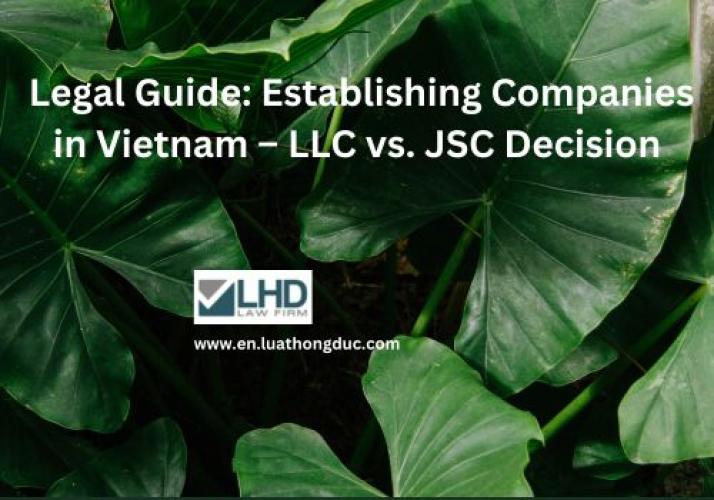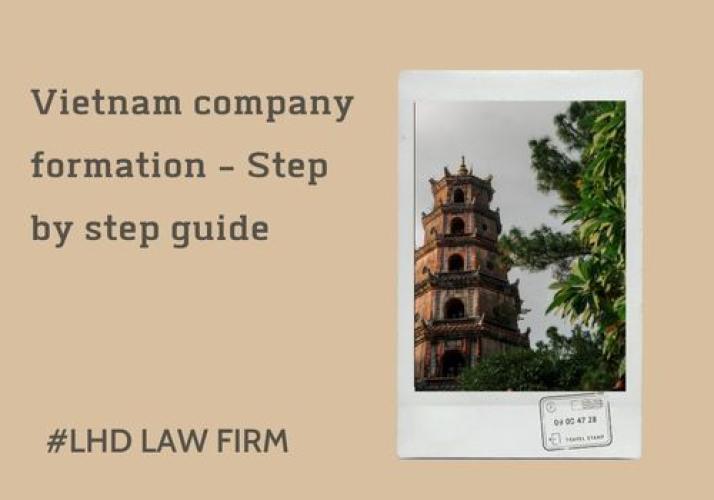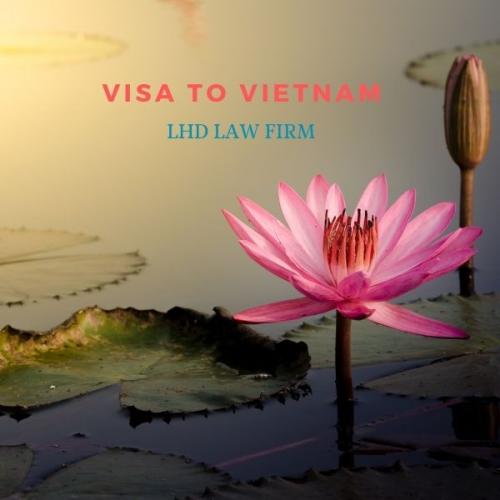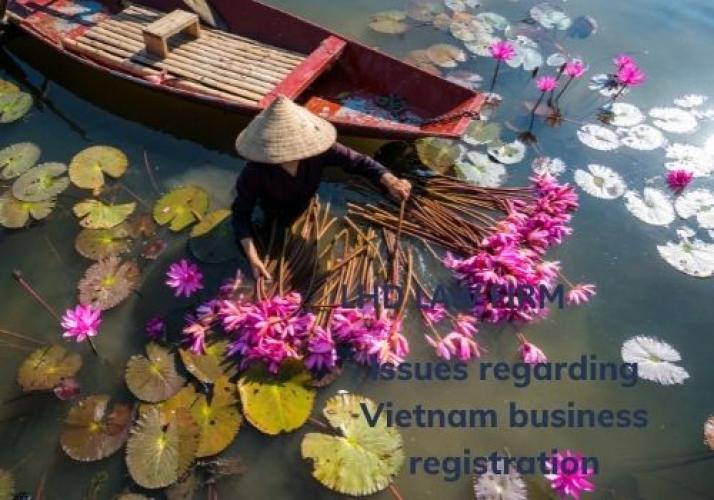Business Registration Certificate Vietnam
- 17/10/2022

 CONTENT
CONTENT
 CONTENT
CONTENT
![heart heart]() HOW TO REGISTER BUSINESS CETIFICATE IN VIETNAM
HOW TO REGISTER BUSINESS CETIFICATE IN VIETNAM
Business registration certificate Vietnam, Enterprise registration certificate is a hard-copy or soft-copy document containing enterprise registration information granted by a business registration agency to an enterprise.
An enterprise shall be granted an enterprise registration certificate when fully meeting the following conditions:
- Its business line to be registered is not banned;
- Its name complies with the laws;
- It has a valid enterprise registration dossier;
- It has paid in full the enterprise registration fee in accordance with the law on charges and fees.
Order and procedures for enterprise registration
Business registration in Vietnam for foreigners – Detail guide
Before proceeding with the procedure to establish a foreign company in Vietnam, you need to learn the legal framework governing foreign investment companies in Vietnam to prepare for establishment.
In fact, the registration procedure for Vietnamese companies has been simplified and streamlined in recent years due to the government's efforts to stimulate foreign investment into the market. This article describes the process of setting up a company in Vietnam for foreign investors, from the extensive legal regulations on foreign ownership to the step-by-step process for incorporation.
Foreign ownership under Vietnamese law
According to Vietnam's Investment Law and Vietnam's WTO commitments, foreign-invested enterprises are allowed to establish in most fields in Vietnam. For example, trade, IT and manufacturing welcome FDI. However, some business sectors such as tourism and advertising require joint venture partners in Vietnam. So, when investing in Vietnam, it is important to first determine the best path to start a business and run a company.
In Vietnam, agreements with the World Trade Organization (WTO) and Vietnam's investment law are allowed to regulate the ownership of foreign enterprises. However, sometimes businesses that are not covered by WTO or domestic law require approval from different ministries.
Vietnamese law on foreign ownership
Differences in business registration between foreign investors and Vietnamese citizens
In Vietnam, land is owned by the whole people and managed by the state. Therefore, private property does not really exist, but is essentially just the right to use state property for a certain period of time.
The main difference that still exists between Vietnamese citizens and foreigners is the duration of the contract. In fact, while Vietnamese citizens do not need a work permit or marriage to have the right to buy property, foreigners only have 50 years of property ownership. However, foreigners married to Vietnamese citizens or overseas Vietnamese can own property almost indefinitely. However, the law now allows the deed to be extended for a further 50 years by submitting it to the People's Council of the province where the estate is located.
Another difference is that you have to inform management that you are leasing the property. Unlike unmarried foreigners, foreigners married to Vietnamese citizens are not required to notify the authorities of the decision to lease the property.
Restrict market access according to national law
According to Vietnamese law, licensed activities in the business sector can be divided into foreign investors and domestic investors who want to operate in Vietnam:
Prohibited industries: According to Article 6 of the Investment Law 2020 applicable to foreign and domestic companies, the following activities are prohibited in Vietnam. In particular, companies in Vietnam must not:
-
Drug dealing
-
Minerals and Hazardous Chemicals Trade
-
buy and sell wild animals
-
prostitution
-
trade in tissues, cadavers, organs and fetuses
-
human clone
-
firecracker trade
-
Provide debt collection services
Conditional industries: In addition to the licensing requirements at Tier 1 of the WTO Agreement, foreign investors are sometimes required to meet additional conditions, especially those related to certain industries and certain activities. Therefore, foreign investors need to pass the secondary approval of market access restrictions stipulated by national law in order to carry out all corporate business activities under the Investment Law of Vietnam.
Prohibited business lines in Vietnam
Capital requirements
Vietnamese law does not clearly stipulate the minimum investment capital to establish a company. However, the Department of Planning and Investment evaluates the grant to see if it is appropriate for the company's program costs. For example, in the manufacturing industry, capital must exceed the cost of machinery. It is therefore advised that the projected capital is realistic and consistent with the proposed business.
Business registration address for foreigners
To set up a company in Vietnam, you need a registered address.
Service-based businesses can use Virtual Offices for registration purposes. However, manufacturers or companies with retail or business space needs need a physical location in Vietnam.
In some cases, the Department of Planning and Investment may require the investor to provide evidence such as a lease agreement and related documents after the establishment.
What kind of legal entity should investors choose?
In most cases, choosing the type of legal entity for a foreign business in Vietnam is a separate process that depends on many context factors. There is absolutely no correct answer. However, we would appreciate it if you could basically understand the strengths and weaknesses of the most common types of legal entities of foreign companies and prepare the raw materials to shape your opinions and decisions.
![heart heart]() Process and procedures for business registration in Vietnam
Process and procedures for business registration in Vietnam
1. Investment registration certificate
The first step to register the establishment of a foreign affiliate company in Vietnam is to obtain an investment registration certificate from the Foreign Investment Department, Ministry of Planning and Investment.
Overall, this process can take up to a month. Processing times can be significantly longer for businesses that are not covered by WTO commitments or require additional permits.
Business registration and investment license registration in Vietnam
2. Business Registration Certificate
The next step is to obtain a company registration certificate or company registration certificate. The file will be created as follows.
-
Business Registration Form
-
Corporate Rules Overview
-
List of owners
-
Passport or other personal membership ID
-
If the founder is a foreign company, a certificate of incorporation and equivalent documents.
-
Investment registration certificate.
3. procedures to apply for a seal for the company
After the certificate of industrial and commercial registration and the certificate of foreign investment are reviewed and approved, the company's seal can be stamped by the social security management office of the city's public security department. . Without a seal, a Vietnamese company cannot register with the tax department, open a bank account or go through other procedures. Processing time is 3 working days.
4. Register your company's tax
The next thing to do is complete the tax registration with the local tax department, including corporate income tax, value added tax, foreign contract tax, consumption tax, import and export tax, tax incentives. , personal income tax.
From the date you receive the Certificate of Business Registration, you have 30 days to complete the tax registration and pay the annual license tax of approximately $90.
5. Capital Account and Opening a Corporate Bank Account
The next step is to secure a capital account, which is used to pump capital abroad and repatriate profits. The initial capital contribution must be made within 90 days from the date of receiving the Enterprise Registration Certificate. Corporate bank accounts as well as merchant accounts can also be opened at this time.
6. Additional license
To close the company registration process, check to see if additional licenses are required (for example, commercial companies may need to complete product registration which can take several months). Certain businesses, such as manufacturing, accommodation and merchandising, may also require additional sub-licensing, which will prolong the business registration process.
Issues in business registration in Vietnam that foreigners need to pay attention
Issue of intellectual property
Vietnam implements a “first filing system”, which means that the first person to register IP in the country will own the rights after having IP. This means that previous users may discover that they have violated subscriptions submitted later
Vietnam is part of the ASEAN Patent Examination Cooperation (ASPEC), a regional patent work-sharing program among the nine participating ASEAN Member States (AMS). The purpose of the program is to share search and examination results among the Participating Offices, allowing applicants in the participating countries to obtain their respective patents faster and more efficiently. ASPEC is free and runs in English.
Customs registration in Vietnam is relatively simple and can be effective. Due to the high level of counterfeiting and piracy, businesses should register with Vietnam Customs
COVID - 19 response
Vietnam's response to coronavirus has been internationally recognized as effective. A robust tracking and tracing system facilitates privacy effectiveness and prompt government action to prevent any outbreak, ensuring low mortality rates and trust. general information on the system.
Vietnam closed its border early. The entry of foreign nationals into Vietnam is strictly restricted to a small number of diplomats on official duty, some highly skilled workers, and some family members. These immigration applications will continue to be processed on a case-by-case basis and the employer or family member must submit it directly to the central/provincial authority for immigration clearance.
Notes when registering business in Vietnam for foreigners
Foreign investors can directly enter the Vietnamese market in a number of ways. Foreign investors must determine whether they wish to invest alone or with other foreigners, or in cooperation with one or more Vietnamese investors. At the same time, investors must consider and choose the most appropriate form of investment, including whether to set up a new company, invest in an existing company with an active management role, or seek other forms of investment such as a branch, representative office or business partnership contract.






_1657697035.jpg)




0 comment